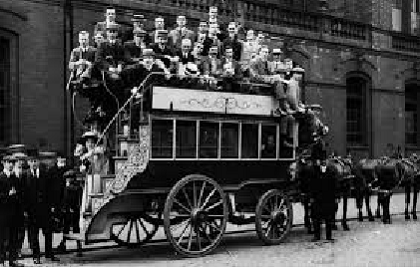
In his recent State of the Union message, citing economic growth in recent years, the President also noted that “… we’ve done all this while cutting our deficits by almost three-quarters.” Later in the speech, the President briefly referred to another recent development, one that suggests he shouldn’t be all that proud of progress on the deficit.
“But, Mr. Speaker, I appreciate the constructive approach that you and the other leaders took at the end of last year to pass a budget and make tax cuts permanent for working families.”
This arrived in “omnibus” spending and tax legislation passed in mid-December.
But -- what’s an omnibus?

“Omnibus” is an old Latin word referring to “for all” or “for everything.” Back in the late 1800s, it referred to a horse-drawn vehicle carrying multiple passengers. Over time, they started calling these things just a “bus.”
More recently, the term has evolved to include legislation that packages other bills, and rolls them all up into one, for the legislature to vote.
In December, the Congress passed an omnibus spending and taxation bill that certainly reached for the “for all” standard. This 2009 page bill, signed by President Obama, was called the “Consolidated Appropriations Act, 2016.”
The bill included provisions for appropriations for agriculture, conservation, rural development, food assistance, food and drug administration, foreign assistance, commerce, justice, science, military personnel, weapons procurement, military research and development, overseas contingency operations and the “global war on terrorism,” the Corps of Engineers, the Department of the Interior, the Department of Energy, the Department of the Treasury, the Judiciary, the Department of Homeland Security, the Environmental Protection Agency, the Department of Labor, the Department of Health and Human Services, the Department of Education, the Executive Office of the President, the Legislative Branch, the Department of Veterans Affairs, the Department of State, the Agency for International Development, bilateral economic assistance, international security assistance, multilateral assistance, export and investment assistance, the Department of Transportation, the Department of Housing and Urban Development, and “intelligence,” among many other things.
The bill did a lot of things, of course, but it appears that backtracking on reducing deficits and debt financing were on the bus, as well.
See David Walker’s (former comptroller general of the US) discussion of the bill here. In conclusion, Walker stated that “Defusing our structural federal debt bomb and creating a comeback in challenged states will require extraordinary leadership from the president and respective governors. It will also require meaningful public engagement to make an effective case for needed reforms and private negotiations to achieve support for such reforms.”

